Content from the Brookings Doha Center is now archived. In September 2021, after 14 years of impactful partnership, Brookings and the Brookings Doha Center announced that they were ending their affiliation. The Brookings Doha Center is now the Middle East Council on Global Affairs, a separate public policy institution based in Qatar.
As Iraqi Prime Minister Mustafa Al-Kadhimi made his way to Washington, D.C. for talks at the White House on Thursday, he left a country that is mired in crisis. Iraq’s political environment is deeply fractious, and there are ongoing protests over socio-economic grievances. Its economy faces possible collapse amid the decline of oil prices and the fallout from U.S.-Iran tensions. All of this has destabilized its security environment, and of course occurs in the midst of the COVID-19 pandemic.
The urgency of addressing these challenges is not lost on the prime minister, who came into office in May in the midst of these crises. He has framed his government as a transitional one, determined to restore some stability to the country. But how can Kadhimi overcome all these challenges? The road to recovery will be beset with wide-ranging, inter-connected problems as a deeply beleaguered population looks for some reprieve from the devastation and conflicts of the past two decades. Yet, Iraq’s single most important path to recovery may come in the form of closer ties to the Arab Gulf states. To date, Gulf monarchies have not invested significant energy and resources in Iraq, while their U.S. and European partners have struggled to enable pathways for increased Gulf investments and support for Iraq as they sought to stabilize the country during the anti-ISIS campaign in recent years. With U.S. support and leadership, Iraq can become re-integrated into the Arab world, re-invigorate a relationship with the Gulf that is based on mutual interests to help revive the Iraqi economy, and reduce its dependence on Iran in the process.
A brief history
Iraq’s relations with Gulf Cooperation Council (GCC) states have been unstable and strained since the 2003 invasion of Iraq, after which the country became a staging ground for proxy conflict and political warfare between Iran and the Arab world. Relations reached their lowest point under Prime Minister Nouri al-Maliki, particularly after the 2011 Arab Spring when Iraq’s powerful political and religious figures backed Shiite protesters in the Gulf. Maliki alienated much of the Arab world, while his sectarian policies and the marginalization of Arab Sunnis further alienated the GCC monarchies. Meanwhile, the GCC has lacked a cogent, long-term, and strategic Iraq policy, and certain Gulf countries stand accused of actually funding militant groups in Iraq that have been responsible for wide-ranging terrorist attacks.
The U.S. shares some of the blame for the deterioration in relations. It moved to back Maliki in 2010 after the country held parliamentary elections, paving the way for the increasingly authoritarian leader to form a coalition and suppress his Arab Sunni political rivals. In many ways, this convinced the GCC that Iraq was effectively a lost cause. There have been some glimmers of hope, like the 2017 bilateral engagements that saw Saudi Crown Prince Mohammed bin Salman promise investments in Iraq. That year, Adel al-Jubeir become the first Saudi foreign minister to visit Baghdad in decades, while the then-Iraqi prime minister, Haidar al-Abadi, visited Riyadh twice.
But Iraqi domestic political dynamics have almost always hindered these efforts. It has not helped that the moderate Iraqi political actors who could champion and forge closer ties with the Gulf have suffered diminished authority. At the same time, Iran-aligned groups have ascended, strongly opposing the notion of stronger Iraq-GCC ties because it would hurt them politically, particularly if spearheaded by Washington.
Today’s picture
Currently, the Arab Gulf’s broad approach toward Iraq is three-fold: Where possible, engage diplomatically with Baghdad’s ruling elite, develop political and economic ties, and contain Iranian influence.
Some Gulf states, like Kuwait, have had more positive relations with Iraq. Kuwait was the only state to have a strong presence at the Arab League Summit in Baghdad in 2012, and hosted the Iraq reconstruction conference two years ago. Saudi Arabia still has no ambassador in Baghdad, although it was reported in May that the Saudi ambassador to Iraq will resume his duties as soon as possible. Relations with Qatar are poor, in light of wealthy Qatari donors’ alleged funding to Iraq’s Sunni militants and the complicity of Iran-aligned groups in the kidnapping of Qatari nationals in 2016.
Bahrain has had agitated relations with Iraq, particularly since 2011 after protesters mobilized against the government with support from the Shiite political class in Baghdad. The United Arab Emirates (UAE) has carefully cultivated strong, personalized relationships with key power centers and brokers, including powerful parties and figures in Erbil and Baghdad. It has a respectable reputation in Iraq for being a regional hub for innovation and trade. The UAE-based energy firm, Crescent Petroleum, has invested over $3 billion in Iraq and has a 20-year gas sales deal with the Kurdistan Regional Government.
But Iraq-GCC ties are unlikely to flourish until the latter no longer views the former predominantly through the prism of its own domestic security considerations vis-à-vis Shiite communities in the Gulf, and until the former is able to truly forge its own foreign relations without submitting to Iran’s preferences. But that should not forestall attempts by the two sides to foster a strategic and sustainable partnership.
America’s potential role
What can the U.S. do? Unlike other issues and objectives (like holding free and fair elections to stabilize the country and restore the public’s trust in the state, or reining in militia groups), there is greater American capacity and influence to shape Iraq-GCC relations, given Iraq’s dependency on U.S. support and longstanding U.S. strategic partnerships in the Gulf.
Washington should continue to help Iraq achieve its road map to energy independence, for one. This involves connecting the power grids of GCC states and Iraq to address Iraq’s chronic electricity shortage, which the Iraqi public has cheered and which provides some basis for a mutually beneficial relationship between Iraq and its neighbors.
But this effort and others will be in vain if the contours of Iraq-Gulf relations are left primarily to anti-GCC or anti-U.S. forces to shape. The view from the Gulf will not look particularly good if GCC investments depend almost entirely on Kadhimi staying in power, and relying on Iraqi state institutions will fail if they (the institutions) succumb to Iranian influence. The U.S. already tried and failed with this approach when it devised a strategy that was based almost entirely on former prime minister Haidar al-Abadi’s capacity to stay in power; Washington promoted him in the region, but he was never well-received or seen as a strong and capable leader in the Gulf. He then came in an embarrassing third place in the 2018 elections, despite overwhelming support from the United States.
Kadhimi has long-standing relationships with Gulf countries and has already been warmly received, as has his finance minister and deputy prime minister, Ali Allawi. But it’s problematic that Baghdad and the Kurdistan Regional Government (a longstanding U.S. partner) are currently embroiled in a major dispute over oil exports and revenue-sharing. That situation will have political and economic reverberations, and adds to Iraq’s already long list of challenges. Sequencing matters: If the U.S. is unable to help two of its most important allies in Iraq forge a durable settlement on oil, then the GCC will wonder whether or how Washington could forge a strategic partnership between Iraq and at least three other regional players in a move that could re-configure the geopolitical landscape.
What the U.S. can and should devise is a set of guiding principles, a framework for forging what would effectively be a U.S.-GCC axis in Baghdad and a GCC-aligned political coalition in Baghdad that creates a sense of direction and a synergy between the extensive ties that some political actors already have with the Gulf. This would develop the modalities for a relationship that has long been needed. It allows for a milestone-based approach that mitigates and reduces the risk for GCC investments, one that moves away from the standardized emphasis on political stability in the country as a whole (which is unrealistic). Instead, it would make way for an emphasis on political stability between U.S. allies as a starting point, so that GCC economic investments in Iraq are tied to Washington’s ability to mediate disputes among its allies and the political consensus among the very groups whose ability to work together will be central to a refashioned relationship between Iraq and the Gulf.
Creating a set of financial and diplomatic incentives and structures for this group of decisionmakers will help them overcome their fractiousness and orient Baghdad more toward the Gulf. That will serve to address the other underlying issue that comes with significantly enhanced GCC ties to Iraq: the threat from Iran. Through a combination of intimidation and coercion, Iran and its allies will torpedo enhanced GCC-Iraq relations, but its capacity to do so will be significantly constrained if it cannot exploit the divisions between their rivals and if its political muscle faces stiff resistance within the Iraqi parliament. The opportunity to translate the Gulf’s global standing, reach, and influence — as well as its trade hubs, access to international markets, and spending power — into political influence can, under U.S. guidance, revive a relationship that both Iraq and the region at large desperately need to achieve some reprieve from conflict and instability.
The Brookings Institution is committed to quality, independence, and impact.
We are supported by a diverse array of funders. In line with our values and policies, each Brookings publication represents the sole views of its author(s).

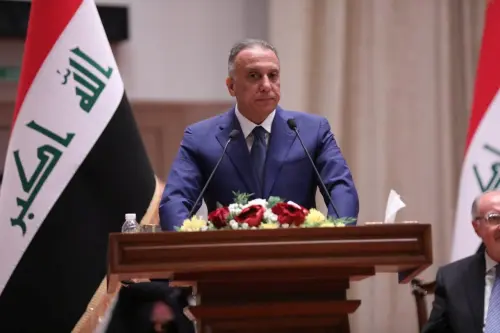
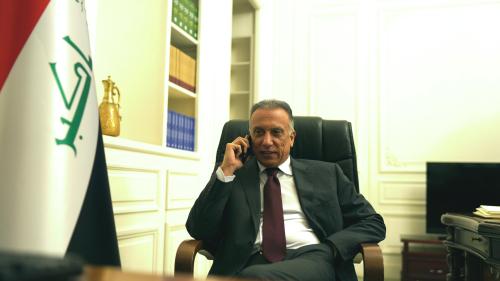
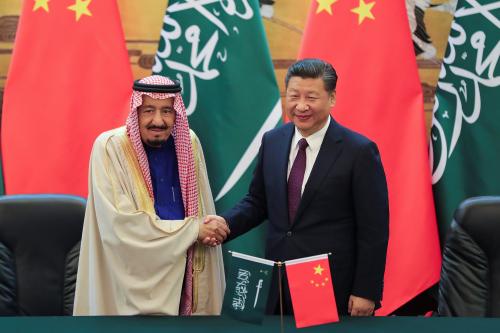

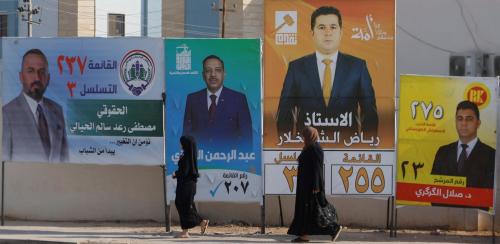
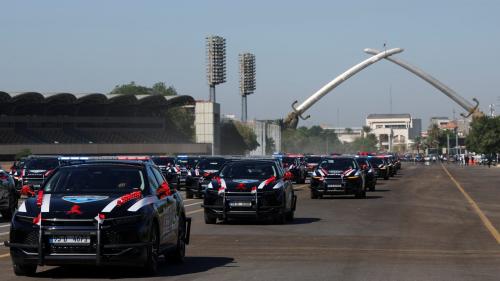

Commentary
Iraq’s best hope is developing stronger ties to the Gulf — with US help
August 19, 2020